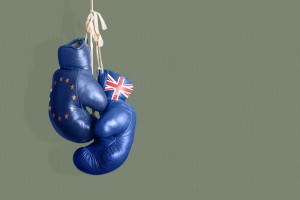A bounce from Q1 likely
 The release of preliminary GDP data for Q2 today will determine the short-term path for the dollar. Following the IMF’s downgrade of full year, 2017, growth expectations from 2.3% to 2.1% today’s data will be eagerly awaited. Q1’s abysmal 1.3% number should be comfortably eclipsed but anything close to 2% (preferably above) will be considered weak.
The release of preliminary GDP data for Q2 today will determine the short-term path for the dollar. Following the IMF’s downgrade of full year, 2017, growth expectations from 2.3% to 2.1% today’s data will be eagerly awaited. Q1’s abysmal 1.3% number should be comfortably eclipsed but anything close to 2% (preferably above) will be considered weak.
The dollar has been in virtual freefall since the failure of President Trump to pass his healthcare reform proposals. This has led to market scepticism over his fiscal reform and economic stimulus packages.
The dollar index has fallen by 3.5% this month alone mostly on political woes. The third attempt to gain approval for a replacement of Obamacare has failed overnight with three Republican Senators, including veteran Presidential Candidate John McCain, voting against.
Any perceived dollar strength will be derived from weakness in other currencies, in particular the Euro and pound which are likely to correct for differing reasons.
The Euro has fulfilled its technical target at 1.1780 and should correct to shake out weak longs before recommencing its trek towards 1.2000. The pound could suffer as the MPC remains on hold next week.
Brexit disagreements to push back timeline
 It is ironic given the time it takes for anything to be agreed by Brussels that Michel Barnier, the Chief EU Brexit Negotiator is even considering a timeline for agreement of the first set of negotiations.
It is ironic given the time it takes for anything to be agreed by Brussels that Michel Barnier, the Chief EU Brexit Negotiator is even considering a timeline for agreement of the first set of negotiations.
The Irish Border, the fate of EU citizens in the U.K. and the “Brexit Bill” remain firmly unresolved.
Brexit could be a calamity for the Irish Republic who enjoy several concessions from the U.K. Government over and above what is required under EU statute. Free movement has been a right for Irish citizens since independence and it is unlikely that it is the intention of the U.K. Government to change it. However, the heavy-handed negotiating style of the EU could harm that.
There is a fundamental disagreement over who protects the rights of EU citizens in the U.K. following Brexit. The U.K. wants it to be the U.K. judicial system, while the EU insists it should the the European Courts. It is unlikely that this issue will be resolved quickly as Michel Barnier demands.
The less said about the highly emotive issue of the “Brexit Bill” the better. It is almost impossible to decide the rights and wrongs of this issue other than to say it is nothing new in divorce that no matter how watertight a prenuptial agreement may appear, there will always be disagreement.
Next week’s data set to provide short-term direction
 Next week will start with an interest rate decision in Australia. The AUD has been strong recently breaking above 0.8000 before correcting a little. The RBA Governor signalled three months ago that interest rates had bottomed and the next move would be a hike. It is difficult to say if the data releases in the time since that comment have been strong enough to warrant a hike. In the current environment, a wait and see policy is likely to prevail.
Next week will start with an interest rate decision in Australia. The AUD has been strong recently breaking above 0.8000 before correcting a little. The RBA Governor signalled three months ago that interest rates had bottomed and the next move would be a hike. It is difficult to say if the data releases in the time since that comment have been strong enough to warrant a hike. In the current environment, a wait and see policy is likely to prevail.
A rate hike in the U.K. is now almost certainly off the table. It is impossible to imagine a vote for a hike gaining sufficient support particularly from BoE officials who have stanchly stood behind Governor Mark Carney.
There has been a slight “wobble” from chief economist Andrew Haldane who said recently that he was considering changing his vote. How recent data releases, particularly inflation and GDP have affected his intentions will be interesting.
There is a new MPC member joining this month.
Silvana Tenreyro is an unknown quantity. A professor at the London School of Economics, she is published as saying she is concerned about the effect of Brexit on the U.K. economy. This would probably be sufficient for her to be labelled a dove but will have to wait until next Thursday for confirmation.
















